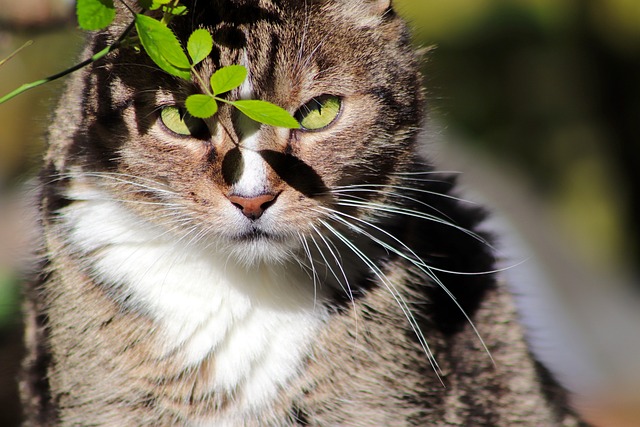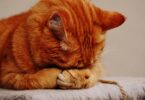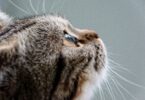Do you have a cat who farts often? Understanding how the feline digestive system works can be helpful for any cat owner. This knowledge includes of course everything related to flatulence (more commonly known as “cat farts”).
While not all animals fart, cats definitely fall into this category. Yet many cat owners don’t even know that cats can get gas because they do so much less frequently and more quietly than other species, such as dogs and humans.
Just like in humans, feline gas occurs when too much gas has built up in the animal’s stomach. Unlike humans, however, cat burps are extremely rare, and that is why gas must escape from the body through another route. In other words, it passes through the digestive system until it can be expelled through the anus.
According to veterinarians, gas is considered “impaired gastrointestinal function”. While they don’t necessarily pose a risk to your pet’s health, any deviation from what is considered “normal” digestion can cause discomfort in your cat. Fortunately, once the cause has been identified, it is very easy to remedy.
Causes of flatulence in cats
There are many reasons why cats fart. The most common is that cats may have swallowed air by accident. According to American veterinarian Dr. Kristine Hoyt, who works at Cats on Call Hospital, these gases can also be due to internal bacteria. “Flatulence in cats can result from an overgrowth of bacteria in the colon, not the usual gut flora that contributes to good digestion, but harmful bacteria,” she explains. This excess of harmful bacteria can in particular be linked to a diet that is too rich or unsuitable. Cats also sometimes fart because of hairballs, digestive problems, or allergies to pollen or fleas, for example.
If a cat just fates once in a while and its gas isn’t particularly smelly, it’s probably because it has swallowed air. This can happen to any cat, especially if it eats too much or too fast.
If the gas doesn’t seem to be due to too much air in her belly, then it’s quite likely that her diet is to blame. It’s important to check how your cat is feeling if (and when) you change its diet. If you change his diet and notice that he starts gasping very soon afterward, there’s a good chance that food is the source of the problem.
Several ingredients often found in cat food can trigger digestive upset in a sensitive cat. If your cat is having a hard time digesting their food, as evidenced by their gas, it would be better not to feed them any type of food: high quality, minimally processed ingredients will be easier to digest. Plus, although it may seem surprising, cats can also react to dairy products and tuna, two ingredients that can cause gas.
Gases can also be caused by “human” eating. Cat food is specially designed to be properly ground by their specific digestive system, and when human food enters the equation, that can mess things up. If you keep on feeding your cat natural ingredients, it is essential that you first know what type of food is suitable for cats, and stick to them. Of course, if you find that even human food suitable for cats causes gas or discomfort, it is best to stop giving it to your pet.
Also, be sure to secure your trash so that your cat cannot access food it is not supposed to eat. A rotting, old piece of meat can appear most appetizing to a cat, and really disturb its digestion and make it very miserable.
How to cure cat farts?
If you have a cat that farts because it swallowed air, maybe you could try feeding it in a glutton-free bowl. This accessory turns the meal into a pleasant and fun moment, and not just a race against the clock!
If you suspect the cause is in your cat’s diet, you may need to experiment a few times before finding the one that works best for her. Choosing quality food with simple, minimally processed ingredients is a good start. If you then want to add more complex ingredients to it and the problem reappears, you will have found what your pet reacts to.
Fiber is an essential part of your cat’s diet, and increasing her fiber intake if she isn’t getting enough can help regulate her digestive system. Be careful, however, because if you increase this fiber intake too much, it can on the contrary worsen its gas. It is important to find the right balance. Probiotics can also help keep your cat healthy and happy.
Feline flatulence and health
If your cat farts frequently and his gas is very smelly, it could also be a symptom of a digestive infection such as Tritrichomonas fetus, or cat trichomoniasis. If your cat’s gas is sustained and/or other symptoms of digestive upset appear, such as diarrhea or vomiting, your best solution is to take her to the vet for a checkup. If possible, bring a recent fecal sample with you to help your veterinarian find out what’s going on with your cat’s digestion.
Most of the time, a few cat farts are nothing to worry about. Their bodies are just processing what is going through them. If you have any questions about your cat’s digestion, your veterinarian is there to answer them and help you understand what’s going on, and even provide personalized feeding advice.







